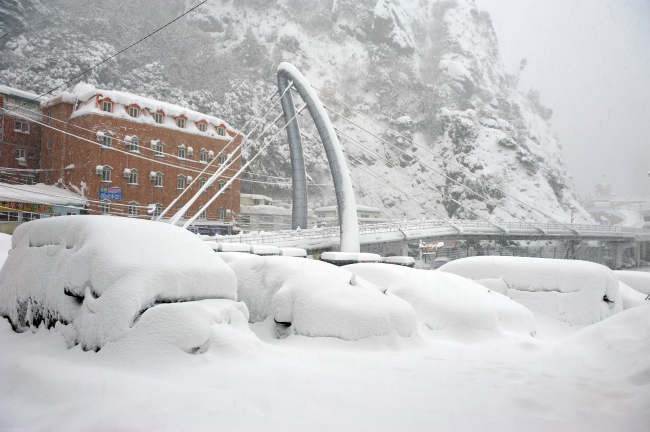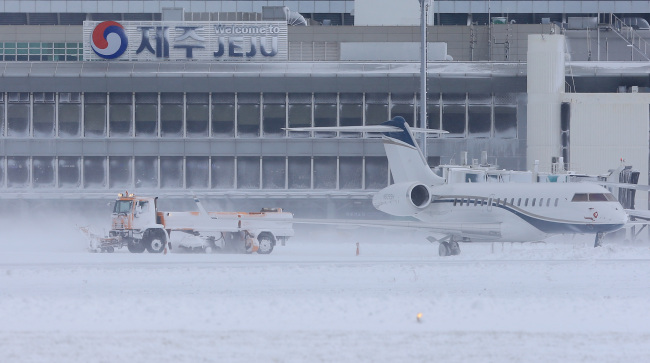SEOUL/JEJUDO ISLAND-- The number of frozen-pipe accidents and hypothermia patients soared while operations at the Jeju International Airport were paralyzed following the biggest snowfall in the region in three decades Sunday, as the nation experienced the coldest weather this winter.
Just a day after the Korea Meteorological Administration issued a cold wave warning for Seoul, temperature in the capital dropped to minus 18 degrees Celsius on Sunday -- the coldest since January 2001. Also on Sunday, the KMA issued a cold wave warning to all regions in Gyeonggi Province as well as Seoul, for the first time in six years.

The cold wave warning is issued if the temperature remains below minus 15 degrees for two or more days.
Meanwhile, all flights at the Jejudo airport were canceled due to the biggest snowfall in 32 years and high winds. The airport on the resort island announced on Sunday morning that all flights will be canceled until 8 p.m. Monday. A total of 517 flights were scheduled for Sunday alone. On Saturday, 296 flights had been canceled while 122 had been delayed due to the weather conditions.
Meanwhile, all flights at the Jejudo airport were canceled due to the biggest snowfall in 32 years and high winds. The airport on the resort island announced on Sunday morning that all flights will be canceled until 8 p.m. Monday. A total of 517 flights were scheduled for Sunday alone. On Saturday, 296 flights had been canceled while 122 had been delayed due to the weather conditions.

Jejudo recorded its biggest snowfall in three decades at 11 centimeters as of Sunday, with more than 1 meter of snow in mountain areas.
On Saturday night, The Korea Herald witnessed a number of road signs being blown down by strong winds accompanied by heavy snow. Some hotels had blackouts on Saturday night.
“It usually takes about 20 minutes to get home from my hotel,” said Oh Seung-ju, a 29-year-old Jejudo resident working at a hotel, who decided to stay back at work on Saturday due to the snowstorm. “My family members told me to stay at the hotel last night, as it’s not safe to drive in such weather. I slept in one of the suites (for the travelers).”
Moon Young-gi, another Jejudo resident and a tourist bus driver, said it took him five hours to get to the city center from Seongsan Ilchulbong, the famous UNESCO World Heritage site of the island on Saturday, because of the severe weather conditions.
“I don’t think my passengers (who are tourists) can visit any tourist sites today,” he said at a hotel in Jejudo. “I’m thinking of taking them to a Korean dry sauna after lunch.”
Meanwhile in the Seoul Metropolitan Area, a large number of accidents were reported due to frozen water gauges and pipes on Sunday.
From 5 p.m. on Saturday to 5 a.m. on Sunday alone, a total of 40 accidents were reported to the Seoul Metropolitan Government. From Jan. 20-23, a total of 764 cases were reported to the authorities. In Gyeonggi, 72 accidents were reported on Sunday alone as of 11 a.m.
“I can’t shower, I can’t do laundry,” said Kim Yeon-ji, a 33-year-old office worker in Seoul, whose water pipe froze on Saturday. “I had to go to a launderette this morning. I was just told that I have to wait until the weather gets warmer. This is very frustrating.”
The KMA also issued one of the three -- heavy-snowfall, cold wave or strong-wind -- warnings to 14 regions in North Jeolla Province, as well as 11 regions in South Chungcheong, including Gimje, Muju, Seocheon and Jeongeup.
The Health Ministry announced on Sunday that the number of Koreans who sought medical attention for cold-related illnesses, such as hypothermia and frostbite, increased significantly on Jan. 17-20 from the week before.
A total of 55 Koreans were treated for such conditions at 530 medical facilities nationwide from Jan. 17-20, which was more than double the number from Jan. 10-16, which was 24. Among the 55 patients, 72 percent were male, while 27.3 percent were those in their 50s.
The health authorities strongly advised young children, those aged 65 older, as well as those who have chronic medical conditions to stay indoors as much as possible and wear long underwear under their clothes, along with socks and slippers even when staying at home. When going outside in the cold, it is important to wear a hat, scarf and gloves to prevent loss of body heat through one’s head and hands, they said.
By Claire Lee and Chung Joo-won (dyc@heraldcorp.com) (joowonc@heraldcorp.com)




![[Herald Interview] 'Amid aging population, Korea to invite more young professionals from overseas'](http://res.heraldm.com/phpwas/restmb_idxmake.php?idx=644&simg=/content/image/2024/04/24/20240424050844_0.jpg&u=20240424200058)


![[Pressure points] Leggings in public: Fashion statement or social faux pas?](http://res.heraldm.com/phpwas/restmb_idxmake.php?idx=644&simg=/content/image/2024/04/23/20240423050669_0.jpg&u=)










